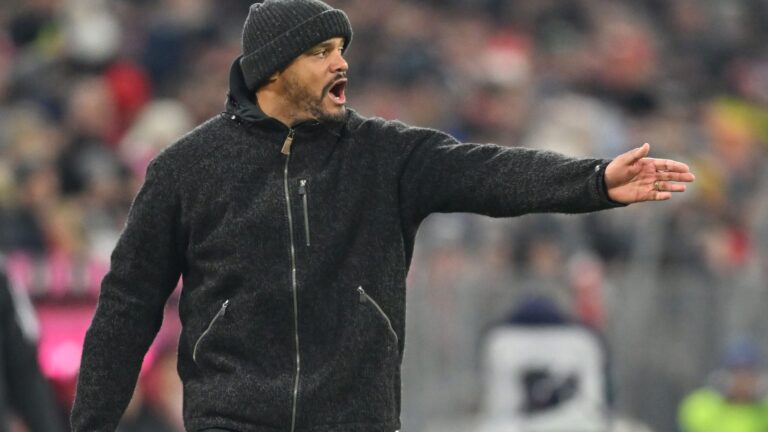- Gravenberch spoke about the Bayern nightmare
- Joined Liverpool in 2023
- Played a key role in Liverpool winning EPL title



Gravenberch won two titles in his first and only season at Allianz Arena, including the Bundesliga trophy, but he rarely got game time under Nagelsmann. The 23-year-old, however, got a chance to redeem himself after he completed a move to Liverpool in the summer of 2023. In his second season at Anfield, Gravenberch became a regular starter under fellow Dutchman Arne Slot and played a key role in helping the club win their record-equalling 20th English top-flight title.
Speaking about his nightmare at Bayern, Gravenberch said: “I was going crazy in my head. I was lucky my parents had moved to Munich for me. I don’t know what would have happened if I had been out there just on my own…it was really tough mentally. I was happy we were champions, but my contribution was small. I know we stood there as champions but I did not feel like a champion at all. It was a totally different feeling from all the other times I won trophies.
“Under Nagelsmann, I would go three matches in a row spending 90 minutes watching my team. That is when I started to go crazy in my head. In the winter, I was totally done with it. During the last two months of the season under (Thomas) Tuchel, I got more minutes than in the entire period before. I remember how I felt at Bayern, but I know I have managed to climb out of that low. And that is what I am proud of.”
Gravenberch’s father, Ryan Sr, further elaborated on his son’s mental condition, as he told Helden: “When you say something like that as a parent, people might think ‘oh dear, here is another father who thinks his son is so brilliant.’ But the football world is hard – and people in that world are too. A lot was said about him, but people forgot this was a young boy of 21.
“The whole Bayern Munich adventure never worked out like he expected. He was working really hard, but he was never given a chance to shine. At that time, we could not dream that he would get a transfer to Liverpool and that Arne Slot would become his coach. When I look at what has happened to him with Slot and Liverpool I have to say in all honesty that he has gone from hell to heaven!”
Gravenberch missed Liverpool’s Community Shield clash against Crystal Palace last Sunday, as he became a father only a day before. The midfielder, though, is set to return to the starting line-up for the club’s Premier League opener against Bournemouth on Friday.
Ryan Gravenberch: From Bayern Munich Turmoil to Liverpool Bliss
Ryan Gravenberch‘s recent move to Liverpool wasn’t just a transfer between football clubs; it was a move towards a healthier mental space. The young Dutch midfielder has openly discussed the difficulties he faced during his time at Bayern Munich, revealing a period of significant mental turmoil stemming from a lack of consistent playing time and a perceived lack of trust from the coaching staff. His transition to Anfield, he says, has been “heavenly” in comparison.
The Bayern Munich Experience: A Struggle for Opportunity
Gravenberch arrived at Bayern Munich in 2022 with high expectations, having established himself as a promising talent at Ajax. However, his time in Germany proved frustrating. Despite his obvious potential, he found himself frequently on the bench, often used as a substitute, and rarely given the opportunity to consistently showcase his abilities. This lack of game time wasn’t simply a footballing issue; it deeply impacted his mental wellbeing.
- Limited Playing Time: Gravenberch started only a handful of Bundesliga matches during his time at Bayern.
- Tactical Mismatch?: Reports suggested a potential disconnect between his playing style and the tactical preferences of then-manager Julian Nagelsmann.
- Mental Strain: The constant uncertainty and lack of opportunity led to feelings of frustration, anxiety, and self-doubt.
- Communication Breakdown: Gravenberch hinted at a lack of clear communication regarding his role within the team.
He described feeling “stuck” and unable to progress as a player. The pressure of playing for a club with Bayern’s stature, combined with the lack of consistent minutes, created a challenging environment. This situation highlights the often-overlooked mental health challenges faced by young footballers navigating the pressures of elite-level competition. The Ryan Gravenberch case serves as a stark reminder of the importance of a supportive environment for player development.
Liverpool: A Fresh Start and a Supportive Environment
The transfer to Liverpool, finalized in late August 2023, represented a lifeline for Gravenberch. He immediately praised the welcoming atmosphere at the club and the faith shown in him by manager Jürgen Klopp. The difference in environment is striking, with Gravenberch emphasizing the positive impact of feeling valued and trusted.
“It feels like coming home,” Gravenberch stated in interviews. “The manager has a lot of confidence in me, and the players have welcomed me with open arms. It’s a completely different feeling to what I experienced in Munich.”
This positive environment has allowed him to rediscover his confidence and begin to demonstrate the qualities that made him such a sought-after talent in the first place. The Liverpool transfer has been lauded as a smart move for both the player and the club.
The Importance of Mental Wellbeing in Football
Gravenberch’s story underscores the growing awareness of mental health issues within professional football. For years, the focus has been almost exclusively on physical conditioning and tactical prowess, but the mental side of the game is now increasingly recognized as crucial for performance and overall wellbeing.
Here’s a quick comparison of the environments:
| Aspect | Bayern Munich | Liverpool |
|---|---|---|
| Playing Time | Inconsistent, Limited | Increasing, Opportunities |
| Managerial Trust | Questionable | High |
| Team Atmosphere | Isolated | Welcoming |
| Mental Wellbeing | Strained | Positive |
Clubs are now investing more in sports psychologists and mental health professionals to support their players. Creating a culture of open communication and providing access to resources are vital steps in addressing these issues. The Premier League, in particular, has been proactive in promoting mental health awareness campaigns.
First-Hand Experience: The Power of Belief
Gravenberch’s experience highlights the profound impact a manager’s belief can have on a player’s confidence. Klopp’s reputation for nurturing young talent and fostering a strong team spirit clearly played a significant role in attracting Gravenberch to Liverpool. The ability to feel trusted and valued allows players to take risks, express themselves creatively, and perform at their best. This is a key element in unlocking a player’s full potential.
Benefits of a Positive Footballing Environment
- Improved Performance: A relaxed and confident player is more likely to perform at their peak.
- Enhanced Creativity: Feeling safe to take risks encourages creative play.
- Stronger Team Cohesion: A positive environment fosters better relationships between players.
- Long-Term Wellbeing: Prioritizing mental health contributes to a player’s overall wellbeing and longevity in the sport.
The Ryan Gravenberch story is a testament to the importance of prioritizing mental health in football. His journey from the struggles at Bayern Munich to the “heavenly” atmosphere at Liverpool serves as a powerful reminder that a supportive environment can be transformative for a player’s career and wellbeing.









